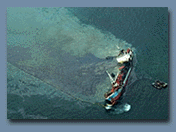ENVIRONMENTAL IMPACTS OF TOURISM
|
EFFECTS OF OTHER INDUSTRIES ON TOURISM
 Impacts
from other industries often have a more dramatic effect on the environment
and can seriously affect tourism. Impacts
from other industries often have a more dramatic effect on the environment
and can seriously affect tourism.
-
Oil spills, like the oil tanker disaster that occurred off the Galapagos
Islands (Ecuador) in January 2001, can cause severe short-term damage
to tourist attractions. In that case, a freight ship loaded with 160,000
gallons of diesel fuel and 80,000 gallons of other petroleum products
ran aground on the coast of San Cristóbal and spilled nearly all of
its load. Unique local marine and land species and the tourism potential
of the area were badly affected.
-
Agricultural runoff or industrial discharges can cause water pollution
and may cause algae blooms like those that occurred in the Adriatic
Sea in the early 1990s. In spite of improved control of sewage from
tourism developments, the Mediterranean sea floor is increasingly
carpeted with these quick-growing invaders, many rising 30 inches
or more above anchoring runners. They appear equally adept at colonizing
rock, mud, and sand in a virtually continuous swath that can extend
from the beach out to a depth of about 150 feet, smothering coral
reefs, fish and other sea flora and fauna in the process.
-
Destructive practices such as blast fishing, fishing with poisonous
chemicals like cyanide, and muro-ami netting (pounding reefs with
weighted bags to scare fish out of crevices) directly destroy corals.
They can also destroy a major draw for tourists.
|
Cyanide fishing was formerly used only to gather tropical fish
for aquariums. Now the demand for live fish in restaurants in Hong
Kong and other Asian centers is also driving this devastating practice.
The market for live fish is now estimated at more than $200 million
annually. Each year, an estimated 330,000 pounds of cyanide is sprayed
on Philippine coral reefs alone. Cyanide fishing operations are
moving from the over-harvested and devastated reefs of the Philippines
to destroy remote and pristine coral reefs in eastern Indonesia,
Papua New Guinea, Palau, Tuvalu, the Federated States of Micronesia,
and other nations in the Western Pacific.
Source: University
of Denver
|
|